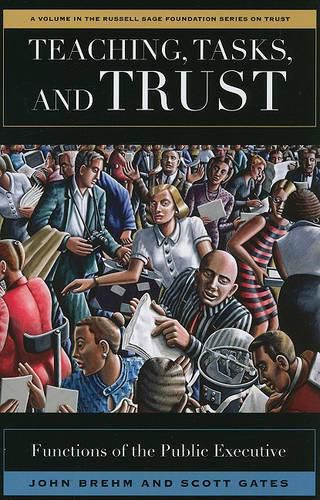Readings Newsletter
Become a Readings Member to make your shopping experience even easier.
Sign in or sign up for free!
You’re not far away from qualifying for FREE standard shipping within Australia
You’ve qualified for FREE standard shipping within Australia
The cart is loading…






The mere word bureaucracy brings to mind images of endless lines, piles of paperwork, and frustrating battles over rules and red tape. But some bureaucracies are clearly more efficient and responsive than others. Why? In Teaching, Tasks, and Trust, distinguished political scientists John Brehm and Scott Gates show that a good part of the answer may be found in the roles that middle managers play in teaching and supporting the front-line employees who make a bureaucracy work. Brehm and Gates employ a range of sophisticated modeling and statistical methods in their analysis of employees in federal agencies, police departments, and social service centers. Looking directly at what front-line workers say about their supervisors, they find that employees who feel they have received adequate training have a clearer understanding of the agency’s mission, which leads to improved efficiency within their departments. Quality training translates to trust - employees who feel supported and well-trained for the job are more likely to trust their supervisors than those who report being subject to constant monitoring and a strict hierarchy. Managers who stand up for employees–to media, government, and other agency officials–are particularly effective in cultivating the trust of their workers. And trust, the authors find, motivates superior job performance and commitment to the agency’s mission. Employees who trust their supervisors report that they work harder, put in longer hours, and are less likely to break rules. The authors extend these findings to show that once supervisors grain trust, they enjoy greater latitude in influencing how employees allocate their time while working. Brehm and Gates show how these three executive roles are interrelated–training and protection for employees gives rise to trust, which provides supervisors with the leverage to stimulate improved performance among their workers. This new model–which frames supervisors as teachers and protectors instead of taskmasters–has widespread implications for training a new generation of leaders and creating more efficient organizations. Bureaucracies are notorious for inefficiency, but mid-level supervisors, who are often regarded as powerless, retain tremendous power to build a more productive workforce. Teaching, Tasks, and Trust provides a fascinating glimpse into a bureaucratic world operating below the radar of the public eye–a world we rarely see while waiting in line or filling out paperwork. A Volume in the Russell Sage Foundation Series on Trust
$9.00 standard shipping within Australia
FREE standard shipping within Australia for orders over $100.00
Express & International shipping calculated at checkout
The mere word bureaucracy brings to mind images of endless lines, piles of paperwork, and frustrating battles over rules and red tape. But some bureaucracies are clearly more efficient and responsive than others. Why? In Teaching, Tasks, and Trust, distinguished political scientists John Brehm and Scott Gates show that a good part of the answer may be found in the roles that middle managers play in teaching and supporting the front-line employees who make a bureaucracy work. Brehm and Gates employ a range of sophisticated modeling and statistical methods in their analysis of employees in federal agencies, police departments, and social service centers. Looking directly at what front-line workers say about their supervisors, they find that employees who feel they have received adequate training have a clearer understanding of the agency’s mission, which leads to improved efficiency within their departments. Quality training translates to trust - employees who feel supported and well-trained for the job are more likely to trust their supervisors than those who report being subject to constant monitoring and a strict hierarchy. Managers who stand up for employees–to media, government, and other agency officials–are particularly effective in cultivating the trust of their workers. And trust, the authors find, motivates superior job performance and commitment to the agency’s mission. Employees who trust their supervisors report that they work harder, put in longer hours, and are less likely to break rules. The authors extend these findings to show that once supervisors grain trust, they enjoy greater latitude in influencing how employees allocate their time while working. Brehm and Gates show how these three executive roles are interrelated–training and protection for employees gives rise to trust, which provides supervisors with the leverage to stimulate improved performance among their workers. This new model–which frames supervisors as teachers and protectors instead of taskmasters–has widespread implications for training a new generation of leaders and creating more efficient organizations. Bureaucracies are notorious for inefficiency, but mid-level supervisors, who are often regarded as powerless, retain tremendous power to build a more productive workforce. Teaching, Tasks, and Trust provides a fascinating glimpse into a bureaucratic world operating below the radar of the public eye–a world we rarely see while waiting in line or filling out paperwork. A Volume in the Russell Sage Foundation Series on Trust